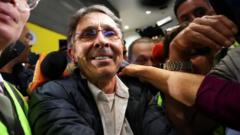After spending more than two decades in a United States prison for drug trafficking, Fabio Ochoa Vasquez, a co-founder of the infamous Medellin drug cartel, has returned to Colombia. At 67 years old, Ochoa was deported by US authorities and arrived in Bogota on Monday, greeted by family and a horde of reporters documenting the moment.
Ochoa was a senior lieutenant under Pablo Escobar during the height of the Medellin cartel's operations, which were characterized by a violent struggle against the Colombian government and rampant cocaine distribution, primarily to the United States. The Medellin cartel was so influential in the cocaine market that it was responsible for supplying approximately 80% of the drugs consumed in the US during its peak in the 1980s.
Upon arrival, Colombia's immigration agency confirmed that Ochoa is not wanted by local authorities and had been released to reunite with his family. Ochoa's history is extensive, involving two separate jail terms in Colombia during the 1990s and an operation in 2001 that saw him extradited to the US where he faced serious charges related to cocaine trafficking. He was arrested during the Millennium operation, which targeted the ongoing drug smuggling activities that persisted despite extradition treaties.
In 2003, he received a sentence exceeding 30 years for his role in a cartel that was smuggling an estimated 30 tonnes of cocaine monthly into the United States from 1997 to 1999. The eradication of the Medellin cartel’s influence was marked by significant violence and shifts in drug enforcement, leading to discussions about international extradition laws that had initially been suspended due to fears of retaliatory violence against extradited suspects.
Ochoa’s return raises questions about the current state of drug cartels in Colombia and the reforms needed in the criminal justice system to deal with drug trafficking. As Colombia continues to grapple with the repercussions of its drug-related history, Ochoa’s arrival serves as a vivid reminder of the complexity of the drug trade and its lasting effects on society, law enforcement, and familial bonds.




















